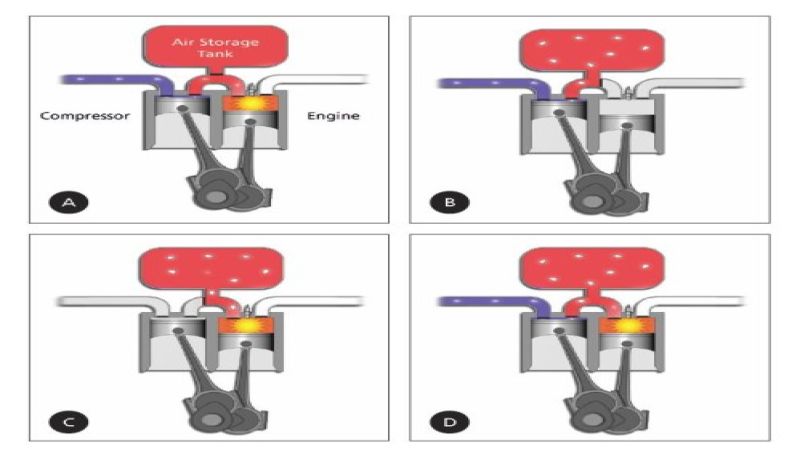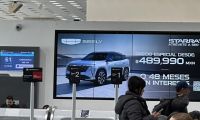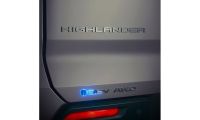Internationally recognized as an engine expert, Professor Hitziger will specifically consult with the Scuderi engineering team on the development and commercialization of its Scuderi Engine and to work on the continued achievement of the engine’s dramatic increases in efficiency.
A few months ago, the company found when the Miller cycle, a well-known combustion process, was applied to its split-cycle engine design, the brake specific fuel consumption (BSFC) decreased by 14 percent while power increased by 140 percent.
According to the media release, Prof. Hitziger visited the Southwest Research Institute (SwRI) in San Antonio, Tex., in mid-August to evaluate the Scuderi split-cycle technology for himself. During his multi-day visit, he met with the development team, as well as reviewed performance data and observed the engine as it ran in SwRI’s engine test cell.
For the record, the Scuderi Engine divides the four strokes of a combustion cycle between two cylinders, where one cylinder functions as the cold-side air compressor, handling intake and compression, while the other hot cylinder handles combustion and exhaust.
By optimizing the split-cycle concept, the engine when fully developed will drastically reduce NOx emissions and substantially improve fuel efficiency, compared to a conventional gasoline engine. The engine requires one crankshaft revolution to complete a single combustion cycle and is projected to have higher torque, thermodynamic efficiency, and lower emissions than possible with today’s engines.
In addition, the Scuderi split-cycle engine technology avails the use of air to make a non-electric hybrid propulsion system that stores energy. This will be in direct competition with higher-cost electrical-based hybrids which function best at low speed as in city driving.
Prof. Hitziger has been an honorary professor at the Technical University of Kaiserslautern for many years, where he lectures on the “Design of modern combustion engines” in the mechanical and process engineering department. Since 1998, he has been a very highly regarded combustion engine expert, officially appointed to the Chamber of Commerce in Germany.
Professor Hitziger held management positions at MAN and Deutz-MWM for over 35 years and is currently a consultant to many international engine developers and original equipment manufacturers.
“The split-cycle principle offers unique benefits unavailable in other propulsion options,” said Professor Hitziger. “It is a great pleasure for me to work on this highly interesting thermodynamic concept and help the Scuderi Group with their efforts to successfully bring this technology to market.”
What This Means to Detroit
It is uncertain just how much Detroit automakers like General Motors Company (NYSE: GM) and Ford Motor Company (NYSE: F) have reviewed or accepted split-cycle engine technology. Fact is, all you heard lately is about existing technology, and very little on the HCCI which stands for High Compression Combustion Ignition; meaning, a diesel cycle that runs on gasoline.
Most important, time is closing fast on the 2016 government mandates; and all the automakers are at similar levesl of engine technology in their attempts to achieve the maximum efficiency of the Miller cycle, using multi-valves, variable cam timing, variable valve timing, direct injection and turbo chargers. Indeed the last threshold for the ICE is splitting the four cycles in half to achieve all that Miller imagined.
When this reporter attended SAE 2011 World Congress last Spring, a few GM engineers as well as German engineers were speaking with Steven Scuderi just before my own interview with him. When asked about others being interested, he noted a few foreign companies had shown signs of interest and were quite willing to sign any disclosure documents.
All of us know the Asian companies, especially Honda and Toyota, had leaped ahead of American automakers in small IC engines using the Atkinson cycle technology. Access to the Scuderi would allow them to remain in that lead, because the engine is capable of being scaled and articulated for gasoline, nat-gas and even diesel. Furthermore, it has that air-hybrid component to its configuration now.
For the record, there is another split-cycle engine out there, and it is an opposed piston design by Tour Engine. That company is slated to start out more with very small, non-automotive engines with the hope the automakers will then take notice. It, too, has air-hybrid capability which was been confirmed by my talk with Dr. Oded Tour.
Another opposed piston design is the two-cycle diesel of Achates Power. While it not a split cycle, it is primed more toward large trucks. Likewise, the Cyclone Power engine, which is an external-combustion, steam powerplant has multi-fuel capability including waste fuel. Raytheon has labeled it "a game changer." It will be making a land speed record attempt in October.
Point is, there are more engines on the horizon that will help the automakers meet 2016 and 2025 MPG requirements than the media has led you to realize. So, best stay tuned to Torque News for the latest on engine technologies.
-----------------------
About the Reporter: After 39 years in the auto industry as a design engineer, Frank Sherosky now trades stocks, futures and writes articles, books and ebooks like, "Perfecting Corporate Character," "Awaken Your Speculator Mind", and "Millennial World Order" via authorfrank.com. He may be contacted here by email: [email protected] and followed in Twitter under @Authorfranks
________________________________________________
Additional Reading:
Scuderi Group releases results of split-cycle engine simulations
Raytheon: Cyclone Power's combustion engine game changer
Scuderi says 50-plus mpg achievable with turbocharged split-cycle air-hybrid engine
Scuderi Air-Hybrid Engine technology setting up to challenge electric hybrids
EPA sets milestone for alternate fuel industry with regulation amendments
Buick LaCrosse with eAssist on par with highway fuel economy of compacts
Cella Energy achievement may make hydrogen fill-up a reality
Stop-start technology to advance more micro hybrids by 2016
Four alternate engine technologies for 2011 and beyond
Set as google preferred source











Comments
Let me see......Why don't you
Permalink
Let me see......Why don't you ever talk about the King of supercharged two-strokes when you write these silly articles...is it like Captive Pulse never existed?....no....it's like you guys are delusional.....fortune fakers and failed fashion victims....
I don't believe anyone but
Permalink
I don't believe anyone but Thomas Graves and Co. had anything to do with the development of this type of engine except to introduce the concept.
They try to make you believe it is a split-cycle engine, but they are simply trying to avoid a direct confrontation with Mr.Graves, and/or his assignees. Scuderi and Tour engines are pale in comparison to the true captive pulse type machines I witnessed in Austin, Texas. The actual technology was beyond any of these new claims even in the mid-90's, before the half-as-good guys were even on the radar. Thomas has labs operating in several states. These new boys couldn't even pass for helpers in a Graves lab. These novice designers have another thing coming.
What ever happened to this
Permalink
What ever happened to this engine and company?